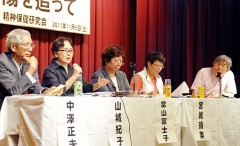Specialist explains post-traumatic stress disorder from the Battle of Okinawa

On November 5, in a public lecture at the Mawashi branch of JA-Okinawa in Naha, doctor of psychosomatic medicine Ryoji Aritsuka (extreme right) and Masao Nakazawa (extreme left) talked about mental trauma in people who experienced the Battle of Okinawa, or the atomic bombings of Hiroshima and Nagasaki.
November 6, 2011 Ryukyu Shimpo
On November 5, at the Mawashi branch of JA-Okinawa in Naha, a public lecture entitled “Following mental trauma from the Battle of Okinawa” was held by the Society for Research on Mental Health in the Battle of Okinawa. Ryoji Aritsuka, a doctor of psychosomatic medicine at the Okinawa Kyodo Hospital, explained the realities of late-onset post-traumatic stress disorder (PTSD) triggered by an experience in the Battle of Okinawa. PTSD can manifest itself in the form of schizophrenia, depression and insomnia in several generations, even including a fetus. His research on PTSD related to the Battle of Okinawa indicates that the psychological damage suffered by people who experienced the Battle of Okinawa was hardly verified or treated during the post-war years when medical care largely lost its structure. Aritsuka pointed out that, “During the 66 years since the end of the war, some people and their families have suffered great pain and feelings of isolation.”
Aritsuka is the head of the Society for Research on Mental Health in the Battle of Okinawa. He introduced a case of PTSD from the Battle of Okinawa in which man in his 70s suffered insomnia probably caused by losing his mother on the battlefield when he was five years old, and a woman now in her 80s who has a burning sensation in her feet probably caused by having stepped on dead bodies to escape the battlefield when she was 14 years old. He explained that unlike these days, there was no mental care at that time, saying, “It was not treated in the period following the Battle of Okinawa. The unusual situation of Okinawa being occupied by a foreign country after the war also needs to be taken into consideration.”
He explained the features of PTSD in the Battle of Okinawa as being:
1. Great sorrow caused by a number of violent bereavements.
2. Experience of “utter depression” caused by losing a place to live.
3. Insomnia and panic disorder.
4. Insults and destructive behavior by the former Imperial Japanese Army.
5. Intergenerational transmission of poor parenting.
There are many cases in which people who witnessed the death of, or saw dead bodies of, family members during the battle went on to experience episodes of sleeplessness once they reached around 70 years old. Aritsuka explained that a death of a close relative also causes insomnia, and mentioned that research carried out overseas suggests that a war experience early in pregnancy may put the child at risk of schizophrenia.
Psychiatrist Masao Nakazawa, who deals with psychiatric research into bomb victims in Hiroshima, journalist Noriko Yamashiro, who is familiar with mental health issues in Okinawa, professor of Okinawa Prefectural College of Nursing, Fujiko Tomiyama, who has worked on the mental health of survivors as a health nurse, and Harumi Miyagi, a researcher of “group suicide” (shudan jiketsu) on Zamami Island, also contributed during the lecture.
(English translation by T&CT, Lima Tokumori and Mark Ealey)
Previous Article:Relocation of U.S. Marines in Okinawa to the United States is the logical option
Next Article:Nago mayor prepared to go on his own visit to the United States in January
[Similar Articles]
- Battle of Okinawa PTSD symposium held at Hitotsubashi University
- PTSD from Battle of Okinawa: sharing pain will help patients heal
- 40% of Battle of Okinawa survivors suffer from PTSD
- Victims of the Battle of Okinawa to take their case to Japan’s Supreme Court after Japan found not liable in reparation lawsuit
- For the first time in 43 years, a collection of new research on the Battle of Okinawa published
 Webcam(Kokusai Street)
Webcam(Kokusai Street)


